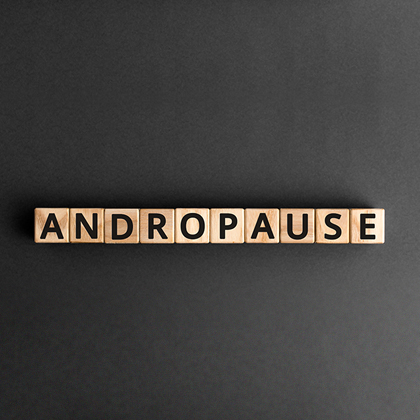
Benign prostatic hyperplasia (BPH), also known as an enlarged prostate, often develops gradually and commonly affects men over 50. As someone living closely with a mature man, you may be the first to spot the signs of an enlarged prostate.
For instance, you may notice your partner gets up frequently to use the bathroom at night, disrupting his sleep quality (as well as yours!). You may also observe he’s exhausted, irritable, and frustrated in the morning, or increasingly anxious to go out and about without easy access to toilet facilities.
 Witnessing your partner struggle with benign prostatic hyperplasia can be troubling, especially when it affects his mental health, social life, and sleep.
Witnessing your partner struggle with benign prostatic hyperplasia can be troubling, especially when it affects his mental health, social life, and sleep.
Unfortunately, broaching the subject of BPH isn’t always easy. Many men shy away from discussions and try to conceal urinary issues from their romantic partners due to embarrassment or fear of feeling ‘emasculated’.
So, if your partner has enlarged prostate symptoms and you’re unsure how to support him, don’t worry. There are plenty of ways to navigate this topic in a sensitive, loving, and judgement-free manner, as we explore below.
Educate yourself
As always, the best place to start is with education. If you want to offer practical and compassionate advice, you have to be willing to learn about prostate health.
Let's dive into some basics. So, what is the prostate? The prostate gland is located just below a man's bladder and in front of his rectum. Its primary function is to produce fluid that nourishes and protects sperm.
As men get older, their prostate gland can naturally enlarge in size. This growth can squeeze the urethra and increase pressure on the bladder, resulting in the urinary problems associated with BPH.
Enlarged prostate symptoms include:
-
A weak or slow urine flow that starts and stops
-
A sudden urge to pass urine
-
Passing more urine during the day
-
Inability to fully empty the bladder
-
Dribbling at the end of urination
-
Frequent urination at night (nocturia)
While any prostate problem can sound alarming, it's worth stressing that BPH is common among older men and generally manageable. Moreover, enlarged prostate symptoms don’t necessarily indicate a higher likelihood of developing a more serious condition, which is reassuring.
Still, BPH symptoms serve as a signal for your partner to seek medical advice, which often includes lifestyle changes, medications, minimally invasive procedures, or surgery.
Although an enlarged prostate isn’t usually a cause for concern, untreated symptoms can significantly affect your partner’s quality of life.
Give him space to talk
Unfortunately, benign prostatic hyperplasia and its associated urination issues can quickly impact your partner’s self-esteem, trigger anxiety and embarrassment, and may disrupt both his work and social life.
One of the most important ways to support your partner in navigating the challenges of BPH is to create a safe and open environment for communication. Initiating any conversation gently and patiently will ensure your partner feels comfortable opening up.
It’s also crucial to think about the setting. Choose moments of relaxation, such as a weekend or on a leisurely walk, ensuring privacy for your conversation.
Start any dialogue gently, perhaps by referencing observations like, "I've noticed that you've been getting up frequently at night, and I just wanted to check in. Is there anything you’d like to chat about?"
Whenever your partner shares their experiences, practise active listening. This means being fully present, maintaining good eye contact, observing body language, and asking open-ended questions. Show understanding and empathy by paraphrasing their words and emotions, asking, "Have I understood correctly? You feel..."
Resist the urge to offer solutions immediately. Instead, inquire about your partner's needs by asking, "How can I help you right now? Do you need guidance or validation?"
Empowering your partner to express his preferences ensures your support aligns and fosters a stronger sense of partnership and understanding.
Gently guide him to seek support
It’s natural for your partner to feel hesitant about seeking help, especially for sensitive health issues like BPH. However, encouraging him to reach out for support can improve his overall wellbeing and quality of life.
You may wish to tenderly and empathetically remind him seeking support is a positive step towards managing his symptoms. You could even offer to accompany him to his appointments for moral support and to take notes.
In addition to medical guidance, you could direct him to our team of expert Nutrition Advisors, who are on hand to provide free, confidential advice. Online resources and support groups may also help.
Encourage him to follow a BPH-friendly diet
Aside from support, adopting a healthy, balanced diet is one of the best ways to manage enlarged prostate symptoms. This doesn’t have to be a solo venture for your partner; you can join him on his journey towards better health.
Rich in plant foods and micronutrients, the Mediterranean-style diet offers incredible nourishment and protection for prostate health (1). This age-old way of eating celebrates fruits, vegetables, whole grains, legumes (chickpeas, lentils), nuts, seeds, omega 3 rich oily fish, herbs and spices, and healthy fats like extra virgin olive oil.
Red meat, caffeine, dairy products, and alcohol can often exacerbate BPH symptoms, so it’s wise to monitor how much you bring into the house.
Besides following a Mediterranean-inspired diet together, you may want to guide your partner towards increasing the following nutrients, which can provide targeted prostate support.
-
Zinc contributes to the maintenance of normal testosterone, fertility, and reproduction. It also helps protect cells from oxidative damage. High levels of stress, caffeine, smoking, and drinking can deplete zinc levels in the body. Meat, shellfish, legumes, whole grains, eggs, cacao powder, nuts, and seeds are excellent sources of zinc.
-
Vitamin D3 plays a critical role in immune function, which supports many areas of men’s health. The best way to synthesise vitamin D3 is from direct sunlight. However, this isn’t always possible in winter, so the NHS recommends supplementing with 10µg from October to March. You can also find small amounts in meat, oily fish, eggs, mushrooms, and fortified foods.
-
Beta-sitosterol is a sterol found in almost all plants and is often recommended for mature men. Fruits, vegetables, nuts, and seeds are naturally rich in beta-sitosterol.
-
Quercetin is a widely researched bioflavonoid and remains a popular choice for men’s health. Good sources include apples, red onions, parsley, sage, tea, blueberries and dark cherries.
You can explore our range of expert nutritional formulas for men aged 50 and above here. For more information on prostate health and diet, read our guide here.
Look after your emotional health
Of course, supporting your partner with BPH can be emotionally taxing for you, too, so it’s essential to look after your mental and emotional health.
Try to carve out time daily for relaxation and self-care, whether it’s mindfulness practices, exercising, or engaging in hobbies you enjoy.
Seeking comfort in your loved ones is also important. Just as you’ve encouraged your partner to lean on you, allow yourself to lean on others for guidance and understanding.
Want to find out more?
Knowing how best to support your partner with enlarged prostate symptoms can be challenging. However, the very fact you want to learn more about this subject is promising in itself.
Remember, you can also contact our team of expert Nutrition Advisors for free, confidential health advice. To learn more about supporting your partner’s prostate health, visit Nutrition Buzz.
A final note from our Nutrition Advisors: If your partner experiences any signs of urinary discomfort, such as nocturia (frequent urination at night), a sensation of incomplete bladder emptying, or a weakened or interrupted urine stream, he must consult his doctor for medical advice. They can help determine if he has benign prostatic hyperplasia or another prostate condition that may need prompt medical intervention.
*Subject to cookie consent
References:
-
Russo GI, Broggi G, Cocci A, Capogrosso P, Falcone M, Sokolakis I, Gül M, Caltabiano R, Di Mauro M., Relationship between Dietary Patterns with Benign Prostatic Hyperplasia and Erectile Dysfunction: A Collaborative Review. Nutrients. 2021;13(11):4148.
You Might Also Like
Disclaimer: The information presented by Nature's Best is for informational purposes only. It is based on scientific studies (human, animal, or in vitro), clinical experience, or traditional usage as cited in each article. The results reported may not necessarily occur in all individuals. Self-treatment is not recommended for life-threatening conditions that require medical treatment under a doctor's care. For many of the conditions discussed, treatment with prescription or over the counter medication is also available. Consult your doctor, practitioner, and/or pharmacist for any health problem and before using any supplements or before making any changes in prescribed medications.

Olivia
Olivia Salter has always been an avid health nut. After graduating from the University of Bristol, she began working for a nutritional consultancy where she discovered her passion for all things wellness-related. There, she executed much of the company’s content marketing strategy and found her niche in health writing, publishing articles in Women’s Health, Mind Body Green, Thrive and Psychologies.
View More



